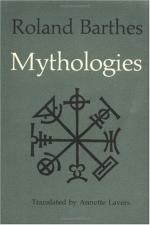
|
| Name: _________________________ | Period: ___________________ |
This test consists of 5 multiple choice questions, 5 short answer questions, and 10 short essay questions.
Multiple Choice Questions
1. Where does the author suggest holidays originate from?
(a) Biblical times.
(b) The Athenians.
(c) The school world.
(d) The judicial world.
2. Which of the following does the author say is impossible to ignore for the bourgeois with regard to art history in "The Blue Guide"?
(a) Greek.
(b) French.
(c) Jewish.
(d) Roman Catholic.
3. Which two organizations are referred to in "Operation Margarine"?
(a) The Police and the Army.
(b) The Navy and the Court.
(c) The Church and the Government.
(d) The Army and the Church.
4. Which of the following is not an industry compared to in "Toys"?
(a) Hair Styling.
(b) Transport.
(c) Teaching.
(d) The Army.
5. How is a writer's holiday different from another tradesman according to the author in "The Writer on Holiday"?
(a) He spends more money.
(b) He travels further from home.
(c) He continues to work.
(d) He drinks more.
Short Answer Questions
1. Who is the inspiration for "Dominici, or the Triumph of Literature"?
2. Which of the following is not one of the things the author says of steak in "Steak and Chips"?
3. What sort of values does steak adhere to in "Steak and Chips"?
4. What does the author say men could conceive of the heavens in "The Jet-Man"?
5. "Chips are ____ and ____ like steak." How is this quote finished from "Steak and Chips"?
Short Essay Questions
1. What are the differences in the hair-styles of Portia and Calpurnia in "The Romans in Films," and what do they suggest?
2. Why are the "Ornamental Cookery" images in Elle magazine put fourth in vain?
3. What is the literature of repletion in "Dominici, or the Triumph of Literature"? What does it lead to?
4. How are "The Nautilus" and "Mysterious Island" similar and different?
5. From reading "Ornamental Cookery," why would you say that Elle creates such a grandiose food section for a working-class readership?
6. What does the author say Garbo's beauty suggests of culture?
7. How can bourgeois toys be be recognized?
8. "Hitch the greatness of the former to the triumph of the latter." To what does this quote from "Operation Margarine" apply?
9. What is the sexist irony of "Novels and Children"?
10. In "Blind and Dumb Criticism," why would a critic admitting that he is not scholarly enough to comment appropriately on the work at hand be toxic to a culture?
|
This section contains 932 words (approx. 4 pages at 300 words per page) |

|




